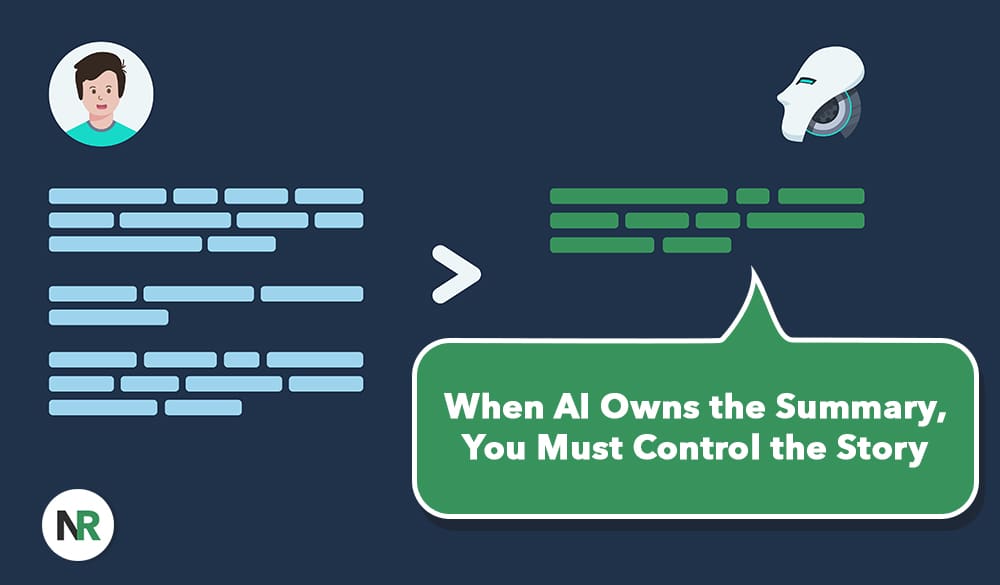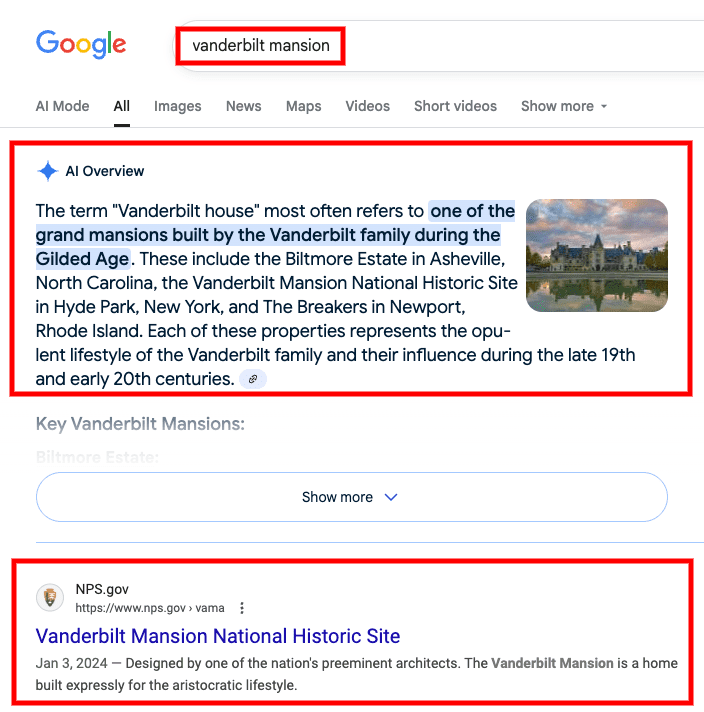Imagine Googling your name or company, and the first thing you see isn’t your website — instead, it’s an AI summary at the top of the search engine results page (SERP). You realize that the summary — one you didn’t create and have no control over — is the first impression people are getting.
With the rise of AI-powered search summaries from Bing Copilot, Google AI Overviews and other AI assistants, your online presence becomes a few auto-generated sentences. The most relevant information may be missing, details could be muddied, and a portion of users won’t ever research beyond that initial paragraph.
That brings us to the purpose of this article: When AI tools own the summary (and very often, they do), you’re responsible for actively controlling the story. Otherwise, a machine will choose and spread your narrative for you.
NetReputation can help you protect your digital presence. Call us at 844-461-3632 to learn more, or fill out the form below for a free consultation.
Request a Free Consultation
How AI Summaries Are Reshaping the World of Online Reputation Management
For many search queries, top-spot summaries have replaced links at the top of the first SERP.
In the past, search results let people select their own sources from the top results. Today, AI summaries combine information gathered online and present an answer before link results.
Even when there are links to the right of the AI summary, the summary itself is the most prominent result. And by providing what seems like an accurate and complete answer, many users don’t feel the need to click any links at all, including the ones that the search engine used to generate the summary. The summary becomes the whole story in these cases.
How Does AI Decide What To Include?
When deciding what to include in a summary, AI tools pull from a mix of sources, including:
- High-authority websites
- News coverage
- Popular articles
- Social media content
Note that AI tools don’t worry about pulling from positive versus negative sources. It’s very possible that unflattering news coverage or social media chatter will make its way into an AI summary whether or not the information is factual.
Moreover, there’s a notable lack of transparency when it comes to exactly how AI features source their information. Here’s how Google for Developers explains AI Overview sourcing:
“Both AI Overviews and AI Mode may use a ‘query fan-out’ technique — issuing multiple related searches across subtopics and data sources — to develop a response. While responses are being generated, our advanced models identify more supporting web pages, allowing us to display a wider and more diverse set of helpful links associated with the response than with a classic web search, enabling new opportunities for exploration.”
The documentation page goes on to say, “AI Mode and AI Overviews may use different models and techniques, so the set of responses and links they show will vary.”
Overall, that’s quite a broad and generalized explanation for how AI summaries gather and display information.
What Are the Implications of AI Summaries for Individuals and Businesses?
Depending on the information used to generate your summary, the results may be beneficial or harmful to your online reputation.
For example, your AI summary could highlight your achievements. Or, it could spotlight a controversy or complaint from years ago.
There’s also the chance of frozen-in-time summary results, meaning they could have outdated information that misleads users. This can cause a problem whether the outdated information is positive or negative.
Let’s say a potential customer is researching different brands and products. The AI overview for their query discusses a competitor of yours. You know that the competitor has faced a lot of negative feedback from customers lately and that the company is going downhill. However, the AI overview is glowing, convincing your audience to trust the brand.
Another possibility is that your AI summary is negative, but it’s based on a couple of old headlines that were part of a smear campaign against you. Since AI won’t take the time to dig in and find out if the reports are accurate, what rises to the top is harmful and incorrect information about you or your company.
In either situation, inaccurate information can do damage to your digital presence and chances of success.
Call us at 844-461-3632 to learn how you can take control of your online reputation.
Owning the Story Is Especially Difficult in the AI Era
There are a number of reasons why it’s becoming more difficult than ever to own your story in the era of AI summaries. Let’s go over some of them:
Context Is Lost
AI overviews condense complex information into just a few sentences. Take the query, “What does the concept of infinity mean?” as an example.
The Google AI Overview condenses one of the most difficult topics to grasp into two sentences. Yes, there’s a bit more information if you expand the section using the Show More drop-down, but some users may not even go that far to learn more.
Plus, the top link result to the right is a Reddit thread, which is not considered an expert source.
In this case, and in others, deep explanations, nuance and trustworthy sourcing are stripped away for a quick-and-simple summary you can skim.
Misinformation Spreads Faster Than Accurate Information
It’s common for AI tools to display outdated information for days, weeks or months after a correction has been issued. Until the AI overview is up-to-date, misinformation will surface and give users an incorrect view of the topic.
Here’s an example from Tom’s Hardware: When the author Googled “how to remember your password,” the top AI Overview suggestion was trying variations of your name and birthday. Of course, this is a definite mistake when it comes to hack-proofing your online accounts.

Source: Tom’s Hardware
While this seems to be corrected now in Google’s AI Overview — using your name or birthday aren’t mentioned anywhere in the summary — the previous result could absolutely mislead users.
AI Summaries Aren’t Trustworthy
The hope is that AI summaries are objective and accurate, but this isn’t always the case. It’s possible for AI-generated responses to be biased, incomplete or just plain wrong.
This is a known issue referred to as “AI hallucinations,” and even Google itself addresses it. According to Google Cloud, “AI hallucinations are incorrect or misleading results that AI models generate. These errors can be caused by a variety of factors, including insufficient training data, incorrect assumptions made by the model, or biases in the data used to train the model.”
Google goes on to explain that AI can provide false positive or false negatives, along with inaccurate predictions.
Have you lost personal or professional opportunities because of a misleading AI summary? Contact us today at 844-461-3632 to discuss repairing your online image.
4 Strategies for Controlling the Story in an AI World
While you don’t have direct control over what an AI summary does or doesn’t say, there are ways to take the reins of your narrative online.
Also, keep this in mind: Even if your name, brand name or niche queries don’t yet result in AI summaries, they could someday. By focusing on your narrative now, you’ll have a better chance of influencing AI overviews in the future.
1. Build an Authoritative Content Base
First, create authoritative, factually accurate, well-structured pages and blog posts on your own website or sites. Focus on developing cornerstone content that clearly tells your personal or brand story.
Then, publish content on high-credibility domains, like LinkedIn and Medium. Using social media and other platforms where you own your content is a great way to influence search results, including AI summaries.
Also, include high-authority industry sites in your list of domains to pitch ideas to or self-publish on, if that’s allowed. You can check the domain authority of a website with this free tool from Moz.
2. Use Structured Data
Structured data, also called “schema markup,” is code that makes it easier for search engines to understand the content of a webpage. It also provides search engines with specific information about your content, such as:
- Event location
- Job title
- Product price
- Recipe cooking time
- Store hours
Plus, schema markup can clarify to a search engine what type of content the page includes, like answers to FAQ, a how-to guide or a video.
By using structured data in your content, you’ll optimize it for a better chance of search engines picking it up, understanding it and using it in AI summaries.
3. Update Incorrect Information Immediately
Whenever content emerges with incorrect information — whether that’s your own content or content produced by someone else — publish a correction as soon as possible. Make sure that your updates are published on an authoritative site.
For example, if you’re building your brand, your website may not be considered a high-authority source yet. While you want to make sure all information on your own site is accurate, you should also publish the correction to a well-known site like LinkedIn.
You could also use press releases for correcting information, as press releases are seen as verifiable sources.
Additionally, try to get trustworthy sources to link back to your accurate content. Let’s say a news site publishes something about you or your brand that’s incorrect. Reach out to them to provide a valid source for the information, and ask that they link to it. Not only will this correct the information that’s spreading online, but it will give your content more authority by being linked to from a known publisher.
4. Consistently Publish Fresh Content
It can be extremely difficult or impossible to remove content from the internet once it’s been published, especially if it’s been posted by someone else. And even when it comes to your own content, if it’s been shared online, it can be nearly impossible to take every instance of it down.
When this happens, your best defense is to suppress that content by posting new content on the sites you do control.
For example, to suppress negative articles written about your company, you could post daily to your website, social media accounts, and third-party sites that let you self-publish, like Medium.
On top of that, collaborating with industry publications for feature articles or interviews could have that new content quickly dominate the top spots. That way, whether the dominant SERP results are AI overviews or links, the content pulled will be the newer, positive content you’ve been generating.
For help with content suppression and building a positive digital reputation, call us at 844-461-3632 today.
Human Storytelling Still Wins Over AI
Despite the advances in AI search tools, human storytelling still wins.
Human-centered narratives are more compelling than informative data. And because they’re more compelling, they’re more likely to be picked up and spread by users … and AI tools.
Moreover, only people can reshape their narratives or their brand stories. AI reports on what’s already out there, but it’s humans who decide what’s put out there in the first place.
Just consider all of the celebrities and public figures who have reshaped their reputations — they’re responsible for generating new information, and only then can AI tools find and share that information.
Here’s another consideration: In an increasingly machine-driven world, people are craving more emotional connection with humans. By combining facts with the type of compassion and meaning only a human can, you’ll dominate in both areas: accuracy and heart.
Looking Ahead: What We Expect From AI Tools in the Future
AI summaries and other search features aren’t going anywhere. In the future, we expect AI summaries that are even more personalized than they are now. Plus, they’re bound to draw from more real-time sources to provide more accurate overviews.
Moreover, it’s likely that we’ll see all sorts of AI integrations beyond search platforms.
What does that mean for us? It means that we can’t control the existence of AI summaries. But we can control the material they work with.
Today, online reputation management is no longer optional. Without taking proactive steps to monitor and manage what’s floating around about you online, you’ll lose control.
Control the Narrative With Professional Online Reputation Management
The introduction of AI overviews has increased the chance of reputational damage. Unlike with traditional SERPs, there’s no longer a buffer of multiple viewpoints when searching online.
Your story’s going to be told whether you’re involved or not. Don’t delay the basics of ORM: content development, reputation monitoring and correcting misleading information.
For help with these strategies and more, get in touch with our team today by calling 844-461-3632 or filling out the contact form below.













